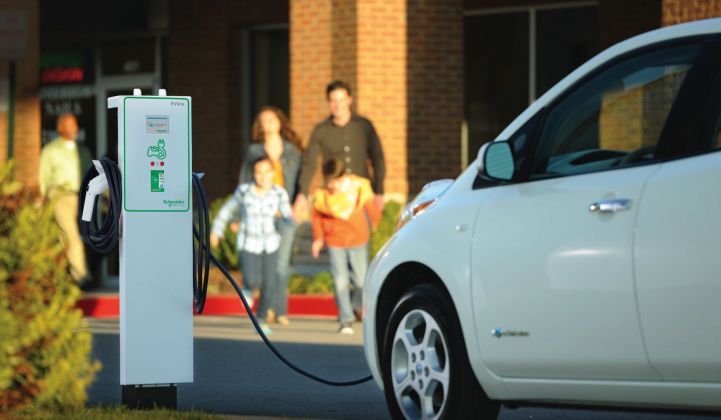EV charging companies have been falling left and right over the past year or so -- but at least one pair of partners is ready to pick up the slack.
Back in September, we reported that startup ChargePoint and French power electronics giant Schneider Electric were quietly rolling out combined EV charging technology for hotel chains, corporate business parks and other North American customers. On Monday, these two partners made the relationship official, announcing that Schneider’s EVlink charging systems will now come with ChargePoint’s networking technology for public charging stations.
The news comes amidst a string of bad news for EV charging startups and their customers, including both the drivers of cars subscribed to various services and the owners of charging stations. ChargePoint competitors ECOtality and Better Place both went bankrupt last year, leaving thousands of charging stations around the country without support.
Another competitor, 350Green, has been linked to reports of FBI investigations into the failures of its deployment in the Chicago area. (Florida company Car Charging Group has taken over 350Green and ECOtality’s networks, giving it 13,430 charging points across the U.S. as of October.)
Large-scale, government-backed deployments across the country have been moving slowly, as with NRG Energy’s eVgo deployment in California, or have completely fallen apart, as is reportedly the case with Chicago’s charging project. Meanwhile, Schneider's competitors have stepped out of the public EV charging business, as Germany’s Siemens did last year, or have gone quiet, as Swiss power giant ABB did after its partner ECOtality went under.
What do Schneider and ChargePoint plan to do differently? First of all, they’ve got a healthy number of deployments that have already been carried out, giving them plenty of experience to draw on. ChargePoint has about 17,000 charging stations networked to date, according to its latest figures, and Schneider has more than 10,000 of its EVlink charging systems deployed around the world, Mike Calise, director of electric vehicles for Schneider Electric’s North American operations, said in a recent interview.
Second, the two have been piloting their combined technologies with customers ranging from cities and universities to corporate clients, Calise said. “We wanted to make sure it was done properly and we’ve piloted it very extensively, and now we’re ready to roll it out.”
Finally, the partners have timed the launch of their combined product to match the growth of the EV market, which was essentially nonexistent only three years ago, but is set to grow to about 100,000 vehicles sold this year, Calise said.
“Some of the companies that failed in the early [phase], they had some good ideas, but they couldn’t pull together the right partnerships and the right resources,” he said. One critical part of that, he said, is supporting the owners of these EV charging stations with a robust and scalable technology platform, including service staff that can properly install chargers and respond within hours to problems -- a big improvement from reports of rival charging systems that have remained off-line and idle for months.
Corporate and institutional customers “now need solutions that are going to meet their large corporate campus needs. […] The challenges that still exist are around the knowledge base of knowing how to manage this new infrastructure."
Calise didn’t provide many details on which customers are using the Schneider-ChargePoint offering, beyond noting that Caesars Entertainment, which installed eight stations at Harrah’s Reno and another eight stations located at its Lake Tahoe properties in a pilot project, is now rolling them out to all of its North American properties.
Schneider was looking at different go-to-market strategies for its EVlink charging stations, including financing models, he said. ChargePoint launched its own $100 million charging station financing program in October with Key Equipment Finance, offering low-cost installations that are paid off over time.
ChargePoint makes its own charging stations, as well as working with a number of manufacturers including Eaton, Fuji Electric, Leviton and Siemens. Simon Lonsdale, ChargePoint’s vice president of business development, noted that the company’s network is compliant with the Open Charge Point Protocol, an emerging standard used to network charging stations in Europe and North America.
ChargePoint also has partnerships with EV makers, such as BMW, which is using the company’s network for North American buyers of its i3 EV, and Nissan, which last month offered free public charging for two years to buyers of its Leaf EV in 25 North American markets via ChargePoint, AeroVironment, NRG Energy’s eVgo, and ECOtality’s Blink stations, now under Car Charging Group’s management.
“We’re still seeing the major players coming into this market,” Lonsdale said. “As we look at the market going forward, the breadth of the impact on the grid of electric vehicles, as the growth rate continues, is where we see the strength of this relationship.”
That could include demand response, energy storage and solar-grid integration capabilities, Calise noted, though he said Monday’s announcement doesn’t specifically address those future possibilities. As GTM Research analyst Magdalena Klemun has observed, plug-in EVs can be considered the “mobile agents of the grid edge,” offering their services to shift peak energy usage to off-peak times, absorb locally produced solar power, store excess wind power at night, and balance local electricity supply and demand in microgrid settings.
Right now, the partners are only deploying Level 2 chargers, which can top off a typical EV battery in about 4 hours, Calise said. Fast DC chargers, which can charge an EV battery in less than an hour, are further out on the partners' roadmap, he said.



